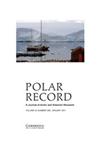Between global collaboration and national competition: Unraveling the many faces of Arctic science diplomacy
IF 1.6
4区 环境科学与生态学
Q3 ECOLOGY
引用次数: 5
Abstract
Abstract It has been argued that science diplomacy (SD) helps avoid or mitigate conflicts among stakeholders in the Arctic. Yet underlying some of these well-intended and sometimes successful initiatives is a one-sided understanding of SD. The most recent literature takes a more differentiated approach towards the means and ends of SD. It shows that international scientific interaction is shaped by the twofold logic of competition and collaboration. Instruments of SD can be meant to serve national interests, collective regional goals or global agendas. The present paper disentangles these confounding discourses of collaboration and competition based on a conceptually enhanced SD framework. It analyses Arctic strategies and two cases of Arctic SD, the Agreement on Enhancing International Arctic Scientific Cooperation and research activities on Svalbard, to reveal the mechanisms of collaboration and competition in the sphere of international science in relation to security, environment and economy. By pointing out where and how science is currently being used in the Arctic, this article provides (a) a systematic overview of the state of SD in the region and (b) a tool for policy-makers and scientists to assess what impact different facets of SD have in Arctic politics.在全球合作与国家竞争之间:揭示北极科学外交的诸多面貌
有人认为,科学外交有助于避免或减轻北极利益相关者之间的冲突。然而,在这些善意的、有时是成功的举措背后,是对可持续发展的片面理解。最近的文献对SD的手段和目的采取了更有区别的方法。这表明国际科学互动是由竞争与合作的双重逻辑形成的。可持续发展工具可以服务于国家利益、集体区域目标或全球议程。本文在概念增强的可持续发展框架的基础上理清了这些令人困惑的合作与竞争的话语。本文分析了北极战略和北极可持续发展的两个案例,即《关于加强北极国际科学合作的协定》和在斯瓦尔巴群岛的研究活动,揭示了国际科学领域在安全、环境和经济方面的合作与竞争机制。通过指出目前科学在北极的使用地点和方式,本文提供了(a)对该地区可持续发展状况的系统概述,(b)为决策者和科学家评估可持续发展不同方面对北极政治的影响提供了工具。
本文章由计算机程序翻译,如有差异,请以英文原文为准。
求助全文
约1分钟内获得全文
求助全文
来源期刊

Polar Record
环境科学-环境科学
CiteScore
1.40
自引率
25.00%
发文量
26
审稿时长
>36 weeks
期刊介绍:
Polar Record is an international, peer-reviewed scholarly periodical publishing results from a wide range of polar research areas. The journal covers original primary research papers in the humanities, social sciences, physical sciences, life sciences, and polar technology, as well as papers concerning current political, economic, legal, and environmental issues in the Arctic or Antarctic. Polar Record endeavours to provide rapid publication, normally within nine months of initial submission.
 求助内容:
求助内容: 应助结果提醒方式:
应助结果提醒方式:


